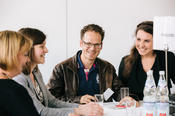Gründen aus der Wissenschaft
On May 3, 2016, Junges Wissenschaftsforum Dahlem was dedicated to the founding and support of research-based businesses. Three founders of academic startups as well as the team of Profund Innovation, responsible for the transfer of knowledge and technology at Freie Universität Berlin, were the invited experts. The centerpiece of the evening was a roundtable forum. At each of the three tables, a young entrepreneur and an advisor from Profund Innovation answered all the guests’ questions.
Dr. Julia Rosendahl develops a feed additive providing healthy nourishment for dairy cows. Her company PerformaNAT was founded on the basis of a patent which the veterinary practitioner applied for via Freie Universität during her PhD. Her admission into the EXIST start-up program marked Rosendahl’s first step towards self-employment. Her advice to all those interested in founding a start-up: most important for a new business, besides a good idea, will be the right team.
Dr. Benny Briesemeister showed that founders also need stamina. His company NEUROSPECTIVE uses neuro marketing to research the successful marketing of products and the prediction of buying decisions. The trained psychologist proved a lot of perseverance and commitment in capturing the market. After several smaller pilot projects, he is now often hired by major companies to find out what goes on in the minds of consumers.
Sinologist and computer linguist Dr. Janna Lipenkova is also active in market research. In her Anacode Ltd., she developed a soft ware facilitating the understanding and evaluation of Chinese customer needs. Like the other two entrepreneurs, she was supported by Profund Innovation from the very beginning. She described entrepreneurship as a “work in progress”, having had no more than a vague idea at first. Final touches followed later, and training courses allowed her to acquire the necessary skills to be a businesswoman in the long term.
All three founders have left university behind nowadays but are still closely connected to research. Julia Rosendahl is currently developing a proto type following initial studies. Benny Briesemeister still follows the state of research in neuro science. Jana Lipenkova publishes papers and attends conferences. Academic start-ups prove to be more than an alternative career option: they forge productive links between academia and the business world.








